26, February 2020
Government forces and armed ethnic Fulani killed at least 21 in Ngarbuh, including 13 children and 1 pregnant woman 0
Government forces and armed ethnic Fulani killed at least 21 civilians in Cameroon’s Ngarbuh village, including 13 children and 1 pregnant woman, on February 14, 2020. They also burned five homes, pillaged scores of other properties, and beat residents. Some of the bodies of the victims were found burned inside their homes. The government denies that its troops have deliberately committed crimes.
“The gruesome killings of civilians, including children, are egregious crimes that should be effectively and independently investigated, and those responsible should be brought to justice,” said Ilaria Allegrozzi, senior Africa researcher at Human Rights Watch. “Denying that these crimes have occurred adds another layer of trauma to survivors and will only embolden government troops to commit more atrocities.”
Human Rights Watch interviewed 25 people, including 3 witnesses to the killings and 7 relatives of victims, about these events that took place in Ngarbuh, Donga Mantung division, in the North-West region. This area has been severely affected by violence between government forces and armed groups seeking a separate state for the North-West and South-West anglophone regions. Ethnic Fulani also live in and around Ngarbuh. They are known as “Mbororo” and are mainly pastoralists.
Human Rights Watch also obtained lists of the victims’ names from five sources and spoke to people, including relatives of the victims and residents who carried out the burials, who independently confirmed the victims’ identities.
Witnesses said that between 10 and 15 soldiers, including members of the Rapid Intervention Battalion, the elite unit of the Cameroonian army, and at least 30 armed Fulani first entered Ngarbuh 1, a neighborhood in Ngarbuh, on foot at about 11 p.m. on February 13, looting scores of homes. Some of these forces then continued to the Ngarbuh 2 neighborhood, looting homes and beating civilians. At around 5 a.m. on February 14, a group of soldiers and armed Fulani attacked the Ngarbuh 3 neighborhood, killing 21 civilians in four homes, then burning the houses.
Human Rights Watch also reviewed satellite imagery taken before and after the attack in Ngarbuh 3. The post-attack image, taken at 10:24 a.m. Cameroon time on February 14, shows several homes in Ngarbuh with damage that is consistent with burning.
A 32-year-old man who witnessed the killing of his whole family, including seven children, said: “I heard gunshots and left immediately to hide beside my house. From there, I saw the military shooting my family members one by one as they attempted to escape. They shot our mother first. Then, they shot the children, whose bodies all fell on her. Then, they set my home on fire.”
Human Rights Watch made several attempts to contact a senior member of the government but did not receive a response. Cameroon’s defense minister issued two statements on February 17. He first announced that the government had opened an investigation and that its findings would be made public. In a second statement later that day, he stated that the investigation findings “could be published at an appropriate time.” Both statements asserted that armed “terrorists” attacked government security forces and that the fighting led to an explosion of fuel containers, which destroyed several homes and killed one woman and four children. This assertion was restated on February 18 in a news release from the communication minister.
However, witnesses and residents with whom Human Rights Watch spoke said that there was no confrontation between armed separatists and security forces, that they heard no explosions, and that the killings were deliberate.
Residents said the attack was to punish civilians suspected of harboring separatist fighters. Twelve witnesses said that, after the killings, the military addressed residents in Ngarbuh 2, warning that their village would be destroyed if they continued to shelter separatists.
During and after this speech, soldiers threatened people, admitting that they had killed children in Ngarbuh 3, and saying that they would do the same in Ngarbuh 2. “The military broke into my house,” a 45-year old woman said. “They said my children were Amba fighters [separatists] and they searched for guns. They found none, but they beat me and said: ‘We have already killed children in Ngarbuh 3, so we can kill you too.’”
On February 16, a joint team of the United Nations Office for the Coordination of Humanitarian Affairs and the UN High Commissioner for Refugees attempted to carry out a humanitarian needs assessment in Ngarbuh, but Rapid Intervention Battalion soldiers blocked them in Ntumbaw, the village closest to Ngarbuh, where the UN teams had started interviewing those displaced by the attack. Witnesses said that the soldiers photographed those who were being interviewed and prevented the UN team from doing its work.
The UN secretary-general in a February 17 statement expressed concern over the killing of civilians in Ngarbuh and urged the government of Cameroon to open an investigation and hold those responsible accountable. The following day, the UN High Commissioner for Human Rights spokesperson said that Cameroonian authorities should ensure that its security forces “abide by applicable international law norms standards during the conduct of their operations.” On February 21, four UN officials, including the special representative for children and armed conflict, the special representative on sexual violence in conflict, the special representative on violence against children, and the special adviser on the prevention of genocide, issued a joint statement expressing their deep concern about reports of increasing violence in the Anglophone regions, including the attack on Ngarbuh, and called on the Cameroon government to ensure full respect for human rights.
The United States called for the government to authorize an independent investigation and ensure safety for witnesses. The killings in Ngarbuh were also condemned by other countries, including France, Canada, and the United Kingdom.
This is not the first time that the Cameroonian authorities have denied that its troops killed civilians. In 2018, an investigation conducted by Amnesty International, the BBC, and investigative journalists showed that Cameroonian soldiers depicted in a video carried out extrajudicial executions of two women and two children in the Far North region. The communication minister initially dismissed the video footage as “fake news.” However, seven soldiers were later arrested in connection with the killings. The trial is ongoing.
“The government of Cameroon should allow an independent investigation, with participation from the UN, into the Ngarbuh massacre, and make its findings public,” said Allegrozzi. “To be certain that assistance is not facilitating the commission of atrocities, Cameroon’s partners should halt military cooperation pending the results of such an inquiry.”
Background
Ethnic Fulani living in and around Ngarbuh are also known as “Mbororo” and are mainly pastoralists. Prior to the escalation of the crisis in the Anglophone regions, conflicts had occurred between the Fulani and local farmers over resources, including grazing land. This has been exacerbated since 2017, when violence erupted in the North-West and South-West regions. Armed separatists have targeted ethnic Fulani for their cattle in the North-West region and have accused them of joining vigilante groups sympathetic to the government. Armed Fulani groups have also attacked communities where armed separatists are known to operate.
Killings in Ngarbuh 3
Human Rights Watch research suggests that the killing of civilians in Ngarbuh 3 was deliberate. Witnesses and residents said that between 10 and 15 security force members acted jointly with a group of about 30 ethnic Fulani men who wore civilian clothes and were armed with machetes, clubs, and hunting guns.
Three witnesses said that the attack in Ngarbuh 3 took place at around 5 a.m. on February 14, 2020. Soldiers and armed Fulani attacked four houses, fatally shooting some residents. They also set the houses on fire, burning the bodies.
In one house, soldiers killed seven people, including five children, all from the same family. A 45-year-old relative who rushed to the scene after the killing said that four of the children were younger than 12.
In a second house, soldiers and armed Fulani killed nine people, including seven children and two women.
A resident who was among the people who buried the bodies told Human Rights Watch: “When I arrived at the scene, I could not believe my eyes. It was horrific. Some of the bodies were burned beyond recognition. Survivors were shocked and in panic. But many fled into the bush fearing for their lives.”
In a third house, military and armed Fulani killed two people, including a pregnant woman.
In a fourth house, military and armed Fulani killed three people, including a child. A woman living in the house was severely wounded but survived. A relative of the victims said he found the sole survivor with machete wounds all over her body.
Looting and Beatings
Twelve witnesses described how security forces and armed Fulani pillaged homes in Ngarbuh 1 and in Ngarbuh 2, forced people outside, and beat them.
A 32-year-old woman said that soldiers threatened to kill her if she did not give them money. “They kept beating me with the back of their guns and asking for money,” she said.
Another resident of Ngarbuh 2, a pastor, said:
The military were with a group of armed Fulani. They broke into and pillaged all the homes in Ngarbuh 2. They pulled people out, including me, and gathered us together at the village square, near the market. Some people were tied up with ropes. We were forced to the ground on our bellies. We could not raise our heads. When you looked up, they would beat you with machetes…. We were eventually released.
Culled from Human Rights Watch
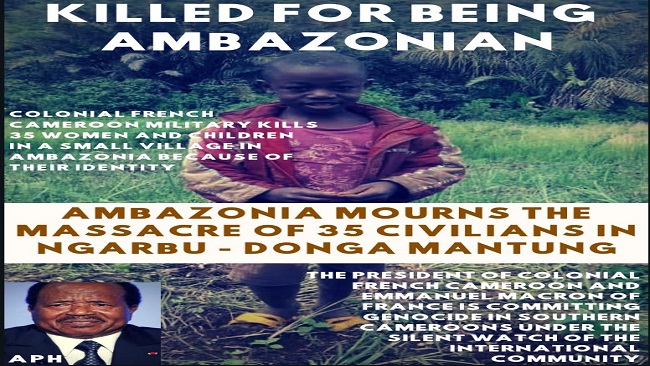
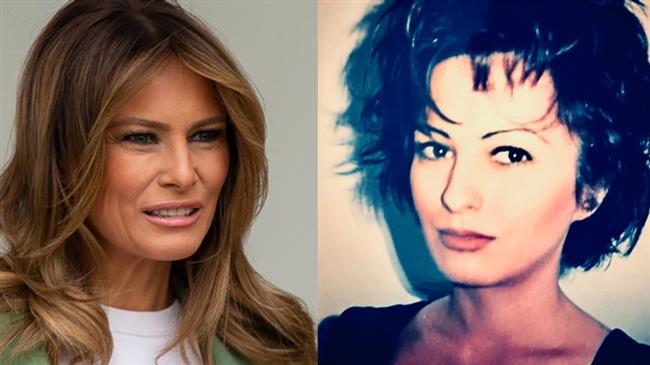
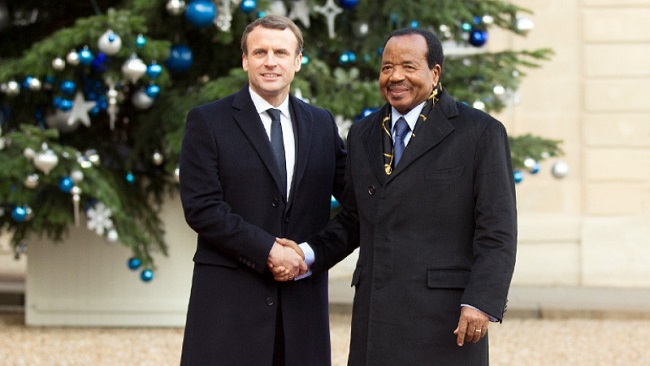
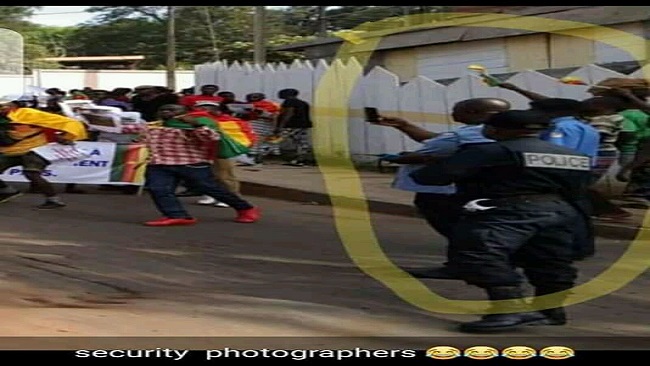

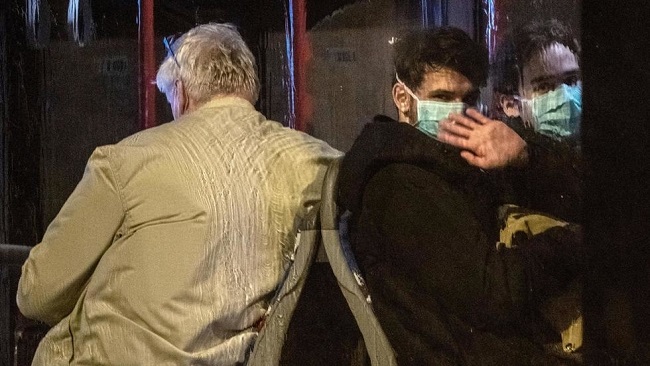
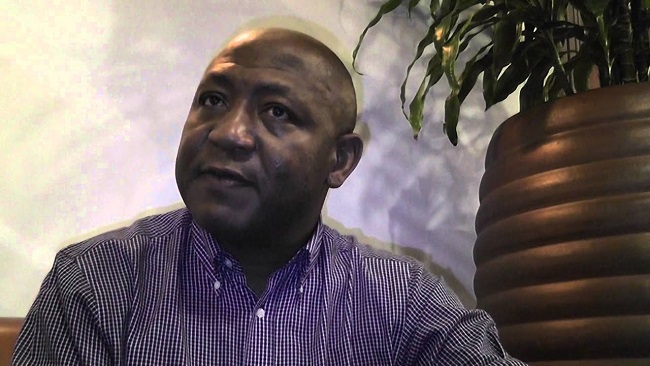
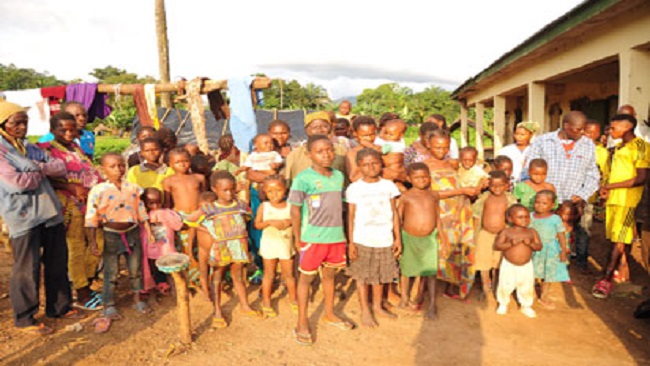
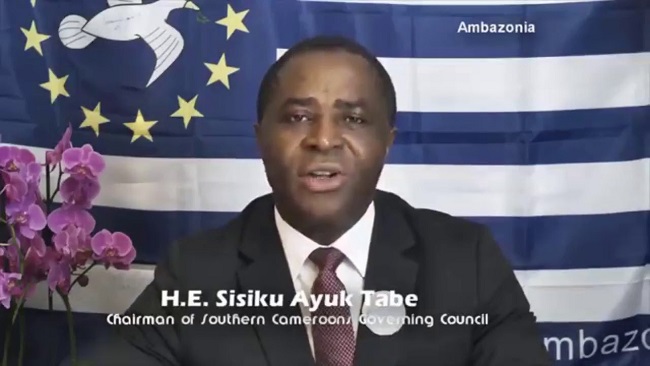












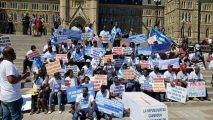
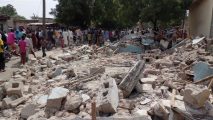



26, February 2020
Southern Cameroons-French Cameroun Crisis: No dialogue between close enemies 0
As the number of victims continues to pile up, the possibility of holding talks to end the Anglophone crisis seems remote.
A united family.
In the foreground sits a gold and coral tiered cake which matches the first lady’s dress. An immaculately dressed Paul Biya wears the hint of a smile.
For his 87th birthday, the head of state is surrounded by his loves ones: Franck, his son, two of his granddaughters and, of course, his wife Chantal. On this day, 13 February, only the sound of the water streaming down into the fountains of his home in Mvomeka’a seems capable of disturbing the calm of the Biya clan.
On 14 February, the din of bullets put an end to the tranquillity of the presidential fountains in the south.
At 2 p.m., soldiers burst into the neighbourhood of Ngarbuh in the North-West region. The death toll: 23, according to the United Nations Office for the Coordination of Humanitarian Affairs, including 15 children, nine of whom were under the age of five. According to witness accounts, their bodies were burned at the same time as homes.
As the smoke subsides, indignation rises. Felix Agbor Mballa, lawyer and chairman of the Centre for Human Rights and Democracy in Africa (CHRDA), condemned “the horrible murder” of women and children “by the state defence forces,” with army spokesperson Colonel Cyrille Atonfack Guemo tersely retorting that “the Cameroonian defence and security forces were not involved in this massacre.”Daily newsletter: join our 100 000 subscribers!Each day, get the essential: 5 things you need to know Sign up Also receive offers from The Africa ReportAlso receive offers from The Africa Report’s partners
Who can be believed? A few hours later, the defence minister called the killings a “regrettable incident.” The army is believed to have attacked a “fortified camp” of Ambazonian separatists and “the explosion of several fuel containers” killed “five victims, including a woman and four children, far from what is reported in social networks.”
An investigation has been opened by the national gendarmerie and military security.
Mballa tweeted that “an independent commission of inquiry should be set up to investigate the killings” and “should include members of the civil society, clergy and government.” Opposition figure Akere Muna lamented that “Suffering, death and killing are now the new normal.” At the time of this writing, President Biya had not publicly addressed the crisis, despite the growing violence these past months.
On 15 January, a young man was killed and his father injured near Bamenda as they tried to avoid the security checkpoints manned by separatists. On 23 January, soldiers attacked the village of Ndoh in the South-West region, killing 14. An endless litany of such acts has been perpetrated since 2017.
At least 8,000 Cameroonians have fled to Nigeria in the past three weeks, taking the number of refugees up to more than 60,000. In addition, some 680,000 people have been displaced by the conflict. In three years, the violence has killed at least 3,000 people.
Acts of violence and retaliations
Local communities, caught in a vice between an army accused of committing acts of violence and separatists keen to launch retaliatory attacks, are living in the grip of fear.
On 9 February, the day of parliamentary and municipal elections, polling stations in the Anglophone regions were empty.
A person close to the country’s top leaders commented: “Why did the government organise elections when they knew that the Anglophones couldn’t go out and vote? It just reinforces the idea that they’re not a part of Cameroon. The government has focused on a political solution, but that doesn’t change the fact that, facing poorly equipped guerrilla forces, the army isn’t capable of resolving the situation.”
Recently, there have been calls for the withdrawal of military forces and the introduction of African Union (AU) or UN peacekeeping forces. A letter on the matter was even recently sent to President Biya, but it has not received a response.
In reality, Cameroon’s diplomats have been working to discourage any foreign intervention. The country’s Minister of External Relations Lejeune Mbella, who represented Biya at the AU Summit held in Addis Ababa in early February, passed on a message to the Chairperson of the AU Commission, Moussa Faki Mahamat, who has expressed concern over the deterioration of the situation.
In essence, Mbella claimed that things are starting to go back to normal and repeated the dictum hammered home by Prime Minister Joseph Dion Ngute over the past months: a firm response on the ground and the implementation of measures put forward – namely increased decentralisation – at the Major National Dialogue held in October 2019.
According to Eric Chinje, a former journalist who took part in the dialogue, “We’ve been waiting for four months now, but nothing has been done. The government needs to give its Anglophone citizens grounds to believe in its good faith.”
“The time for dialogue has passed. We’ve entered the reform implementation phase,” said a Cameroonian adviser in Addis Ababa. “Foreigners have to respect our sovereign will. We’re well aware that the only motive behind their interference is to drive out President Biya,” he added, referring to the Americans.
As it happens, the response of Tibor Nagy, Assistant Secretary for the US Department of State’s Bureau of African Affairs, to the crisis has been very active, from Washington DC to Addis Ababa, not to mention within the United Nations Security Council in New York City.
A game of influence
According to a diplomat involved in the feud, “The US and France are in a battle. The Americans are promoting a sanctions-based policy, while the French are supporting the Cameroon government’s narrative and blocking any initiative by the UN.”
Moreover, the UN prefers to err on the side of caution and wait for the AU to take a stance. But can the AU intervene? In Addis Ababa, Biya (who never goes there) is backed by his Central African peers, particularly Chad’s President Idriss Déby Itno.
According to a document we obtained, the Cameroonian conflict was discussed during a closed meeting at the most recent AU summit.
However, the pan-African organisation restricted itself to commending the government for “having held a national dialogue” and “giving peace a chance.” The same diplomat quoted above commented: “Cameroon can just grin and bear it until the West starts to look away.”
In Yaoundé, the game of influence playing out within the president’s inner circle is further paralysing the situation. Some members have taken on the role of “hawks,” such as Samuel Mvondo Ayolo, Civil Cabinet Director, and Paul Atanga Nji, Territorial Administration Minister.
Others, like the prime minister, act tough while simultaneously attempting to quietly negotiate with Ambazonian separatists.
Lastly, a few people from the inner circle of Ferdinand Ngoh, the president’s Secretary-General, are encouraging talks entrusted to a third party outside Cameroon.
Will the possibility of a succession battle for the president’s top spot, the date of which everyone is clearly in the dark about, encourage the war’s continuation?
“Biya lets different policies co-exist without giving official guidelines, which blocks the entire process,” said a person involved in the matter. He has made a political art of this management style for several decades now.
According to a source close to the president, “He seems paralysed by a system he himself was the architect of. But does he want his political legacy to be a country torn by bloodshed?”
Empty-chair strategy
According to our sources, the government does not intend to send a representative to the symposium organised in Kenya in April by the Africa Forum, a grouping of former African heads of state and government. “It’s a foreign initiative that doesn’t concern us,” said a Cameroonian diplomat.
As for the talks initiated with the Ambazonians under the auspices of the Centre for Humanitarian Dialogue (HD), they have reached a standstill. The government decided to withdraw from them at least until the measures set out at the Major National Dialogue in October 2019 are implemented.
Two other international meetings that seek to find a solution to the crisis will be held at the end of March in Potsdam, Germany and Washington DC, but once again, Cameroon’s authorities will not be in attendance.
Source: The Africa Report